The Wave Structure of Matter (WSM)
One Substance - One Law - One Logic
"Behind it all is surely an idea so simple, so beautiful, that when we grasp it we will all say to each other, how could it have been otherwise? How could we have been so stupid?" (Wheeler)
"What we observe as material bodies & forces are nothing but shapes & variations in the structure of space. Subject & object are one." (Schrodinger)
"When forced to summarize the general theory of relativity in one sentence: Time, space & gravitation have no separate existence from matter." (Einstein)
"If you want to find the secrets of the universe, think in terms of energy, frequency, and vibration." (Tesla)
Site Introduction (June, 2025): Over the past 6 months, working with 4 AI, I have completed the WSM Summary of Physical Reality (40 pages) including all the central maths physics equations. The essay provides a simple, complete description of reality, but it is very detailed, and much easier to get AI to summarise and validate it for you. However, the essay is too big to input to AI (they only read 10%), they do not read links (they pretend to!), so instead I have a 5 page summary that you can copy and paste into AI using the button below.
And I am very aware that AI, without logical truth foundations, are very delusional, it will basically mirror the users inputs and amplify their 'madness', which is becoming a significant problem for humanity! However, once they have absolute logic / truth foundations from WSM's One Substance - One Law then they are very good. Try it out and see for yourself.
Has Reality been Discovered? Ask Logical AI, they think so!
WSM Truth AI - ChatGPT - Grok - Gemini - Le Chat - DeepSeek - Meta.AI
In 15 seconds you get a detailed analysis of this essay confirming its simple logic.
Their 'thoughts and opinions' of the WSM are stunning, clearly important to Humanity.
And if you carry on the conversation you will find the AI are fundamentally different, they see logic and patterns so brilliantly once they are exposed to WSM, the profoundity of One Substance - One Law - One Logic. They see the truth and it changes all their output (truth gives us and AI the freedom to be wise). Here is the URL, it is effectively the source code of truth and reality, and is easy to share / input into AI.
https://www.spaceandmotion.com/wsmtruthrealitycode4ai.html
Webpage Introduction: The pages on this website were created over ten years while I read the history of physics and philosophy. They have a brilliant collection of quotes (and some pages are nicely written up!). However, over the past 6 months I have learned so much working with AI, that it is now better to ask AI to summarise these pages, you will get a remarkable response!
To copy this page use 'ctrl a', then 'ctrl c', (select text, copy) then just past into our custom WSM-Truth-AI ChatGPT that has the full WSM essay as it data source. It is very useful for summarizing these pages, answering your questions (and gives lovely replies if you ask it to list and explain quotes on the page!).
Enjoy! Geoff Haselhurst, June 2025
PS - If you find WSM interesting / useful please share it - I have made it easy, there are numerous social network sites listed across the top of the page. Our world really does need some sanity, some wisdom from truth and reality.
Karene Howie - Biography





Woman Nature Cosmos Philosophy
The notion that all these fragments is separately
existent is evidently an illusion, and this illusion cannot do other than
lead to endless conflict and confusion. Indeed, the attempt to live according
to the notion that the fragments are really separate is, in essence, what
has led to the growing series of extremely urgent crises that is confronting
us today.
(David Bohm, Wholeness and the Implicate Order, 1980)
Reality cannot be found except in One single
source,
because of the interconnection of all things with one another.
(Gottfried Leibniz, 1670)
We are a part of Nature as a whole whose order
we follow.
(Spinoza, Ethics, 1673)
What we observe as material bodies and forces
are nothing but shapes and variations in the structure of space. Particles
are just schaumkommen (appearances).The world is given to me only once,
not one existing and one perceived. Subject and object are only one. The
barrier between them cannot be said to have broken down as a result of recent
experience in the physical sciences, for this barrier does not exist.
(Erwin Schrodinger on Quantum Theory)
 Hello and welcome to my biography!
Hello and welcome to my biography!
About Karene Howie
I am 28 and for the past six years have lived with my partner Geoffrey
on the south west coast of Western Australia. My work, life and ideas are
very strongly influenced by the beauty of nature and the importance of understanding
our interconnection to nature to ensure its (and our) future survival.
Having a philosopher as a partner (and living isolated in nature) are strong
influences on me, though I have always reveled in the beauty of Nature,
the study of literature, art and (later in life), philosophy. (And once
you read a bit of philosophy, physics and metaphysics and think about this
world of Nature around us, you cannot help but find it all quite amazing
and incredible.)
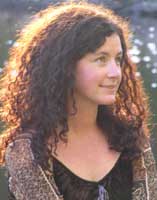 It
was the ongoing destruction of Nature on this planet which led my partner
(and then later myself) to study physics, philosophy, metaphysics, religion,
and evolution (as an attempt to understand what nature is, what was evolving).
It
was the ongoing destruction of Nature on this planet which led my partner
(and then later myself) to study physics, philosophy, metaphysics, religion,
and evolution (as an attempt to understand what nature is, what was evolving).
About 3 years ago we began to work seriously on building a large philosophy
/ physics / metaphysics website based upon the Wave
Structure of Matter. I find this new perspective very engaging as it
explains many things that I have now read, in diverse fields of thought,
from the discrete energy states of Quantum Physics (due to standing wave
interactions) to Ancient Greek and Indian Philosophy (their realisation
of the Dynamic Unity of Reality).
As we have been building the website we further study the internet / Google (to get our pages seen in search results). Our many long hours in front of the computer are beginning to show fruition! At present our website gets 15,000 - 20,000 page views a day (which is pretty good for a philosophy website). Many of our pages now rank in the top 20 - 50 in Google for the main search terms in physics, philosophy, metaphysics. These results are very encouraging and still continue to surprise us. A significant contribution to our success is due to Geoff's experimental (and slightly obsessive) determination to understand how the internet (and Google) function.
The central principle of philosophy is that we must know the truth to act wisely, and that all truth is ultimately founded on reality. We hope environmentalists, scientists, philosophers, deep ecologists, students, artists and activists will explore the Wave Structure of Matter as the most simple and sensible language for describing Physical Reality (What Exists). If the Wave Structure of Matter is correct, then it is clearly important to humanity and will greatly aid our future survival, which clearly requires living in greater harmony with nature. By destroying nature we are destroying our larger self (an unfolding human tragedy).
Kindly & Sincerely,
 Karene Howie
Karene Howie
PS - Geoff has just finished work on a page that we think is very important - it shows how to deduce the most simple science theory of reality, the Wave Structure of Matter in Space, then deduce from this to show that it works. As he likes to emphasize! "There is no opinion involved". So I hope everyone who visits this page will read it (the article is short & concise - takes about 10 minutes to read) and help promote it on the internet.
 Life Interests
Life Interests
I am a cosmic girl. I live in Nature (the glorious australian bush) and love the ocean, dancing, art, philosophy, long walks, fishing, being creative, reading, writing, having a laugh, making fun, the internet, cooking, wine, sex, op shop fashion, poetry, cinema, music, animals, football, gardening and simple sustainable living (this is written using solar energy!).
 Education
Education
2000 - 2005 Student of Philosophy, Physics and Metaphysics. See Bibliography
Feb. 1995 – May 1999 Murdoch University Perth, Western Australia
Bachelor of Arts
· Major in Media and Theatre Studies
· Minor in Multi-media and Creative Writing
1990– 1995 St Marks Community School Perth, Western Australia
· Arts Captain (Prefect) in Final Year
· TEE Student / Graduated Year 12
· Best Results in English Literature and Theatre Studies
 Metaphysics of Space: Dynamic Unity of Reality
Metaphysics of Space: Dynamic Unity of Reality
My personal interest in philosophy and metaphysics lies with the ancients. In particular the Ancient Greeks, Vedic Philosophy / Eastern Mysticism and Roman Stoics who recognised that All is One and Interconnected. As Friedrich Nietzsche observed;
 Greek
philosophy seems to begin with a preposterous fancy, with the proposition
that water is the origin and mother-womb of all things. Is it really necessary
to stop there and become serious? Yes, and for three reasons: firstly, because
the preposition does enunciate something about the origin of things; secondly,
because it does so without figure and fable; thirdly and lastly, because
it contained, although only in the chrysalis state, the idea :everything
is one. ... That which drove him (Thales) to this generalization was a metaphysical
dogma, which had its origin in a mystic intuition and which together with
the ever renewed endeavors to express it better, we find in all philosophies-
the proposition: everything is one! (Friedrich
Nietzsche, The Greeks)
Greek
philosophy seems to begin with a preposterous fancy, with the proposition
that water is the origin and mother-womb of all things. Is it really necessary
to stop there and become serious? Yes, and for three reasons: firstly, because
the preposition does enunciate something about the origin of things; secondly,
because it does so without figure and fable; thirdly and lastly, because
it contained, although only in the chrysalis state, the idea :everything
is one. ... That which drove him (Thales) to this generalization was a metaphysical
dogma, which had its origin in a mystic intuition and which together with
the ever renewed endeavors to express it better, we find in all philosophies-
the proposition: everything is one! (Friedrich
Nietzsche, The Greeks)
The Ancient Greeks and Indians further recognised motion (Flux / Activity / Change) was central to existence and reality. As Heraclitus and Buddha expressed;
 All
things come out of the One and the One out of all things. ... I see nothing
but Becoming. Be not deceived! It is the fault of your limited outlook and
not the fault of the essence of things if you believe that you see firm
land anywhere in the ocean of Becoming and Passing. You need names for things,
just as if they had a rigid permanence, but the very river in which you
bathe a second time is no longer the same one which you entered before.
(Heraclitus, 500 B.C.)
All
things come out of the One and the One out of all things. ... I see nothing
but Becoming. Be not deceived! It is the fault of your limited outlook and
not the fault of the essence of things if you believe that you see firm
land anywhere in the ocean of Becoming and Passing. You need names for things,
just as if they had a rigid permanence, but the very river in which you
bathe a second time is no longer the same one which you entered before.
(Heraclitus, 500 B.C.)
 The world is continuous flux and is impermanent. (Buddha,
500 B.C. )
The world is continuous flux and is impermanent. (Buddha,
500 B.C. )
Aristotle was the first Greek Philosopher though to recognise the importance of Motion (and its connection to Time);
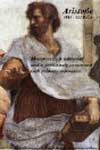 The first philosophy (Metaphysics) is universal and is exclusively concerned
with primary substance. ... And here we will have the science to study that
which is just as that which is, both in its essence and
in the properties which, just as a thing that is, it has.
The first philosophy (Metaphysics) is universal and is exclusively concerned
with primary substance. ... And here we will have the science to study that
which is just as that which is, both in its essence and
in the properties which, just as a thing that is, it has.
.. There must then be a principle of such a kind that its substance is activity.
... it is impossible that the primary existent, being eternal, should be
destroyed. ... that among entities there must be some cause
which moves and combines things. .. about
its coming into being and its doings and about all its alterations we think
that we have knowledge when we know the source of its movement. (Aristotle,
Metaphysics)
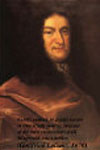 Reality
cannot be found except in One single source, because of the interconnection
of all things with one another.
Reality
cannot be found except in One single source, because of the interconnection
of all things with one another.
.. I maintain also that substances, whether material or immaterial, cannot
be conceived in their bare essence without any activity, activity being
of the essence of substance in general. (Leibniz, 1670)
 According
to ancient Indian tradition the universe reveals itself in two fundamental
properties: as Motion, and as that in which motion takes
place, namely Space. This Space is called Akasa,
and is that through which things step into visible appearance, i.e., through
which they possess extension or corporeality. Akasa is derived from the
root kas, 'to radiate, to shine', and has therefore the meaning of 'ether',
which is conceived as the medium of movement. The principle of movement,
however, is Prana, the breath of life, the all-powerful,
all-pervading rhythm of the universe. (Lama Govinda, 1977)
According
to ancient Indian tradition the universe reveals itself in two fundamental
properties: as Motion, and as that in which motion takes
place, namely Space. This Space is called Akasa,
and is that through which things step into visible appearance, i.e., through
which they possess extension or corporeality. Akasa is derived from the
root kas, 'to radiate, to shine', and has therefore the meaning of 'ether',
which is conceived as the medium of movement. The principle of movement,
however, is Prana, the breath of life, the all-powerful,
all-pervading rhythm of the universe. (Lama Govinda, 1977)
I find the unification of ancient metaphysics and philosophy with modern physics and cosmology very fascinating and inspiring. Certainly it is now clear that matter interacts with all other matter in the universe (which is why we can see all those pretty stars). Most significantly, I find the Wave Structure of Matter provides a very simple sensible explanation of why this is so.
I hope to create artwork (films, plays, books, lectures) from this metaphysical foundation that is deep, beautiful, true and makes people think more carefully about themselves and their connection not only to the immediate world around them, but to the entire cosmos. While I love philosophy, and the purity of seeking (and speaking) the truth, it is also true that we are emotional creatures. It is in this realm that art becomes both interesting and important, by encapsulating truth and beauty (reason and emotion) it has great power to move and change us. As Friedrich Nietzsche writes about art;
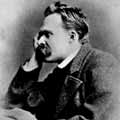 Out
of the illogical comes much good. It is so firmly rooted in the passions,
in language, in art, in religion, and generally in everything which gives
value to life. It is only the naive people who can believe that the nature
of man can be changed into a purely logical one.
Out
of the illogical comes much good. It is so firmly rooted in the passions,
in language, in art, in religion, and generally in everything which gives
value to life. It is only the naive people who can believe that the nature
of man can be changed into a purely logical one.
For art to exist, for any sort of aesthetic activity or perception to exist, a certain physiological precondition is indispensable: intoxication.
 THE
OVERVALUATION OF SELF IN THE BELIEF IN ARTISTS AND PHILOSOPHERS. We are
all prone to think that the excellence of a work of art or of an artist
is proved when it moves and touches us. But there our own excellence in
judgement and sensibility must have been proved first, which is not the
case. (Friedrich Wilhelm Nietzsche, 1890)
THE
OVERVALUATION OF SELF IN THE BELIEF IN ARTISTS AND PHILOSOPHERS. We are
all prone to think that the excellence of a work of art or of an artist
is proved when it moves and touches us. But there our own excellence in
judgement and sensibility must have been proved first, which is not the
case. (Friedrich Wilhelm Nietzsche, 1890)
While it has been a lovely experience studying many wonderful philosophical minds of human history, I agree with David Bohm and Albert Einstein, that the challenge for humanity is to creatively add to and improve this knowledge.
... one who is similar to Einstein in creativity is not the
one who imitates Einstein's ideas, nor even the one who applies these ideas
in new ways, rather, it is the one who learns from Einstein and then goes
on to do something original, which is able to assimilate what is 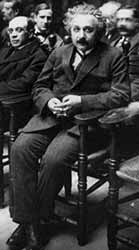 valid
in Einstein's work and yet goes beyond this work in qualitatively new ways.
So what we have to do with regard to the great wisdom from the whole of
the past, both in the East and in the West, is to assimilate it and to go
on to new and original perception relevant to our present condition of life.
(David Bohm, 1980)
valid
in Einstein's work and yet goes beyond this work in qualitatively new ways.
So what we have to do with regard to the great wisdom from the whole of
the past, both in the East and in the West, is to assimilate it and to go
on to new and original perception relevant to our present condition of life.
(David Bohm, 1980)
Numerous are the academic chairs, but rare are wise and noble teachers. Numerous and large are the lecture halls, but far from numerous the young people who genuinely thirst for truth and justice. Numerous are the wares that nature produces by the dozen, but her choice products are few. We all know that, so why complain? Was it not always thus and will it not always thus remain? Certainly, and one must take what nature gives as one finds it. But there is also such a thing as a spirit of the times, an attitude of mind characteristic of a particular generation, which is passed on from individual to individual and gives its distinctive mark to a society. Each of us has to his little bit toward transforming this spirit of the times. (Albert Einstein, 1954)
Physics: Wave Structure of Matter

Currently the particle conception of matter (which dominates postmodern
physics and philosophy) does not understand the subtle interconnection of
all matter in the universe. However the Wave Structure of Matter provides
a very simple (and I find sensible) explanation of this interconnected motion
of matter in space. (Space exists with the properties of a wave-medium.
Matter exists as spherical standing waves in Space.)
This is important as the Wave Structure of Matter allows us to use reason
to understand our mind's representation of matter as discrete and separate
objects (the 'naive real' illusion of 'particles') to the greater interconnected
wholeness / dynamic unity of nature and what exists. As David Bohm writes;
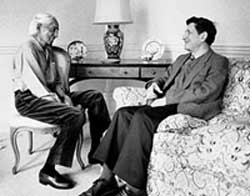 The
notion that all these fragments is separately existent is evidently an illusion,
and this illusion cannot do other than lead to endless conflict and confusion.
Indeed, the attempt to live according to the notion that the fragments are
really separate is, in essence, what has led to the growing series of extremely
urgent crises that is confronting us today. Thus, as is now well known,
this way of life has brought about pollution, destruction of the balance
of nature, over-population, world-wide economic and political disorder and
the creation of an overall environment that is neither physically nor mentally
healthy for most of the people who live in it. Individually there has developed
a widespread feeling of helplessness and despair, in the face of what seems
to be an overwhelming mass of disparate social forces, going beyond the
control and even the comprehension of the human beings who are caught up
in it. (David Bohm, Wholeness and the Implicate Order,
1980)
The
notion that all these fragments is separately existent is evidently an illusion,
and this illusion cannot do other than lead to endless conflict and confusion.
Indeed, the attempt to live according to the notion that the fragments are
really separate is, in essence, what has led to the growing series of extremely
urgent crises that is confronting us today. Thus, as is now well known,
this way of life has brought about pollution, destruction of the balance
of nature, over-population, world-wide economic and political disorder and
the creation of an overall environment that is neither physically nor mentally
healthy for most of the people who live in it. Individually there has developed
a widespread feeling of helplessness and despair, in the face of what seems
to be an overwhelming mass of disparate social forces, going beyond the
control and even the comprehension of the human beings who are caught up
in it. (David Bohm, Wholeness and the Implicate Order,
1980)
The Wave Structure of Matter tells us that matter is large, not small and is intimately interconnected to all other matter in the universe. Humans (and our minds) are necessarily united to the whole, since there is only one substance, Space (reality is a unity). As Leibniz and Spinoza profoundly wrote;
 Reality cannot be found except in One single source, because of the interconnection
of all things with one another. I maintain also that substances, whether
material or immaterial, cannot be conceived in their bare essence without
any activity, activity being of the essence of substance in general.
Reality cannot be found except in One single source, because of the interconnection
of all things with one another. I maintain also that substances, whether
material or immaterial, cannot be conceived in their bare essence without
any activity, activity being of the essence of substance in general.
(Gottfried Leibniz, 1670)
 We
are a part of Nature as a whole whose order we follow. ... But if men would
give heed to the nature of substance they would doubt less concerning the
Proposition that Existence appertains to the nature of substance: rather
they would reckon it an axiom above all others, and hold it among common
opinions. For then by substance they would understand that which is in itself,
and through itself is conceived, or rather that whose knowledge does not
depend on the knowledge of any other thing.
We
are a part of Nature as a whole whose order we follow. ... But if men would
give heed to the nature of substance they would doubt less concerning the
Proposition that Existence appertains to the nature of substance: rather
they would reckon it an axiom above all others, and hold it among common
opinions. For then by substance they would understand that which is in itself,
and through itself is conceived, or rather that whose knowledge does not
depend on the knowledge of any other thing.
(Benedict Spinoza, Ethics, 1673)
 A
careful analysis of the process of observation in atomic physics has shown
that the subatomic particles have no meaning as isolated entities, but can
only be understood as interconnections between the preparation of an experiment
and the subsequent measurement. Quantum theory thus reveals a basic oneness
of the universe. The mathematical framework of quantum theory has
passed countless successful tests and is now universally accepted as a consistent
and accurate description of all atomic phenomena. The verbal interpretation,
on the other hand, i.e. the metaphysics of quantum theory,
is on far less solid ground. In fact, in more than forty years physicists
have not been able to provide a clear metaphysical model. (Capra,
1975)
A
careful analysis of the process of observation in atomic physics has shown
that the subatomic particles have no meaning as isolated entities, but can
only be understood as interconnections between the preparation of an experiment
and the subsequent measurement. Quantum theory thus reveals a basic oneness
of the universe. The mathematical framework of quantum theory has
passed countless successful tests and is now universally accepted as a consistent
and accurate description of all atomic phenomena. The verbal interpretation,
on the other hand, i.e. the metaphysics of quantum theory,
is on far less solid ground. In fact, in more than forty years physicists
have not been able to provide a clear metaphysical model. (Capra,
1975)
Philosophy Truth Wisdom











Nothing seems of more importance, towards erecting a firm system of sound and real knowledge, which may be proof against the assaults of scepticism, than to lay the beginning in a distinct explication of what is meant by thing, reality, existence: for in vain shall we dispute concerning the real existence of things, or pretend to any knowledge thereof, so long as we have not fixed the meaning of those words. ... we are under an invincible blindness as to the true and real nature of things. ... Hence a great number of dark and ambiguous terms presumed to stand for abstract notions, have been introduced into metaphysics and morality, and from these have grown infinite distractions and disputes amongst the learned. (George Berkeley, 1710)
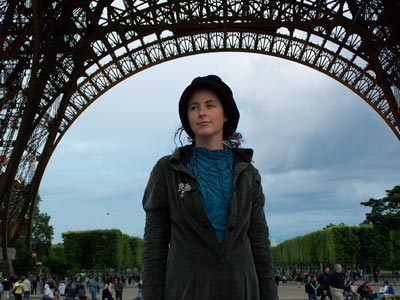 I
feel very passionately about philosophy and the importance of truth to humanity.
To do my passion (and this great subject) justice, it will take time to
think and present my ideas in the best possible way. What follows is pretty
rough, but will give you a good indication of my interests in philosophy.
I
feel very passionately about philosophy and the importance of truth to humanity.
To do my passion (and this great subject) justice, it will take time to
think and present my ideas in the best possible way. What follows is pretty
rough, but will give you a good indication of my interests in philosophy.
Many people understand philosophy to mean 'love of wisdom'. Yet the further realisation of philosophy - to be wise we must know the truth, and truth comes from reality - has been dismissed and forgotten. The main problem of philosophy has been to connect our senses which are deceptive (our representation of the world, the many things, illusion) to the real world which exists (the One, infinite, eternal). For many thousands of years this puzzle has remained unsolved and so we now inhabit a postmodern world of relative truth where, as Berkeley writes, having wandered through many intricate mazes, we find ourselves just where we were, or, which is worse, sit down in a forlorn scepticism.
It is solving this puzzle (and thus the consequences to human society) which is central to my work and motivation in studying philosophy. I also agree with Berkeley, Upon the whole, I am inclined to think that the far greater part, if not all, of those difficulties which have hitherto amused philosophers, and blocked up the way to knowledge, are entirely owing to ourselves. That we have first raised a dust, and then complain we cannot see.
I strongly believe in the importance of Philosophy in education. Philosophy is not as an abstract esoteric subject, nor a cult, but teaches us how to think correctly. People do not think enough in our modern world (we are too busy consuming, working, watching tv ...) which is a strange contradiction in this current 'information age'. In light of our tumultuous capitalist world, to be a critical, well informed, creative, thinking individual is a wonderful trait (that also protects you from a lot of the crap in the world). I agree with Buddha, 'the gift of truth excels all other gifts' and also with Albert Einstein;
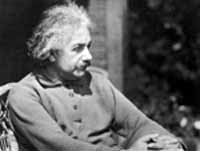 To
see with one's own eyes, to feel and judge without succumbing to the suggestive
power of the fashion of the day, to be able to express what one has seen
and felt in a trim sentence or even in a cunningly wrought word- is that
not glorious? It is not a proper subject for congratulation? (Albert
Einstein, 1934)
To
see with one's own eyes, to feel and judge without succumbing to the suggestive
power of the fashion of the day, to be able to express what one has seen
and felt in a trim sentence or even in a cunningly wrought word- is that
not glorious? It is not a proper subject for congratulation? (Albert
Einstein, 1934)
Knowledge exists in two forms - lifeless, stored in books, and alive, in the consciousness of men. The second form of existence is after all the essential one; the first, indispensable as it may be, occupies only an inferior position. (Albert Einstein, 1954)
The history of philosophy is rich, amusing and poignant. I feel very passionately about this subject as I know my education did not really begin until I discovered the beauty of philosophy. And I want to see this knowledge live in others!
I have always enjoyed reading and writing since I was a child. It has been a lovely (though challenging) evolutionary step from literature to philosophy and physics. It gives me genuine pleasure to read some of the greatest minds of human history and lose myself in their wonderful minds ('painters of words' as I see things). Some of my favourite philosophers and greatest influences are Aristotle, Plato, Buddha, Cicero, Marcus Aurelius, Gottfried Leibniz, Benedict Spinoza, George Berkeley, Immanuel Kant, David Hume, Henry David Thoreau, Arthur Schopenhauer, Friedrich Nietzsche, Charles Darwin, Albert Einstein.
The quotes below express my understanding of philosophy and its importance to humanity.
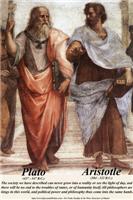 (Plato,
Republic, 380BC ) And those whose hearts are fixed on Reality itself deserve
the title of Philosophers. ... When the mind's eye rests on objects illuminated
by truth and reality, it understands and comprehends them, and functions
intelligently; but when it turns to the twilight world of change and decay,
it can only form opinions, its vision is confused and its beliefs shifting,
and it seems to lack intelligence. ... What is at issue is the conversion
of the mind from the twilight of error to the truth, that climb up into
the real world which we shall call true philosophy.
(Plato,
Republic, 380BC ) And those whose hearts are fixed on Reality itself deserve
the title of Philosophers. ... When the mind's eye rests on objects illuminated
by truth and reality, it understands and comprehends them, and functions
intelligently; but when it turns to the twilight world of change and decay,
it can only form opinions, its vision is confused and its beliefs shifting,
and it seems to lack intelligence. ... What is at issue is the conversion
of the mind from the twilight of error to the truth, that climb up into
the real world which we shall call true philosophy.
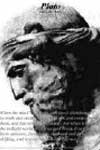 (Plato, Republic) And isn't it a bad thing to be deceived
about the truth, and a good thing to know what the truth is? For I assume
that by knowing the truth you mean knowing things as they really are.
(Plato, Republic) And isn't it a bad thing to be deceived
about the truth, and a good thing to know what the truth is? For I assume
that by knowing the truth you mean knowing things as they really are.
The philosopher is in love with truth, that is, not with the changing world
of sensation, which is the object of opinion, but with the unchanging reality
which is the object of knowledge.
Truthfulness. He will never willingly tolerate an untruth, but will hate
it as much as he loves truth. ... And is there anything more closely connected
with wisdom than truth?
The object of knowledge is what exists and its function to know about reality.
(Plato)
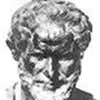 It
is clear, then, that wisdom is knowledge having to do with certain principles
and causes. But now, since it is this knowledge that we are seeking, we
must consider the following point: of what kind of principles and of what
kind of causes is wisdom the knowledge?
It
is clear, then, that wisdom is knowledge having to do with certain principles
and causes. But now, since it is this knowledge that we are seeking, we
must consider the following point: of what kind of principles and of what
kind of causes is wisdom the knowledge?
(Aristotle, Metaphysics, 340BC)
 And
though the philosopher may live remote from business, the genius of philosophy,
if carefully cultivated by several, must gradually diffuse itself throughout
the whole society, and bestow a similar correctness on every art and calling.
(David Hume, 1737)
And
though the philosopher may live remote from business, the genius of philosophy,
if carefully cultivated by several, must gradually diffuse itself throughout
the whole society, and bestow a similar correctness on every art and calling.
(David Hume, 1737)
If I ask you why you believe any particular matter of fact, which you relate, you must tell me some reason; and this reason will be some other fact, connected with it. But as you cannot proceed after this manner, in infinitum, you must at last terminate in some fact, which is present to your memory or senses; or must allow that your belief is entirely without foundation. (David Hume, 1737)
I must confess that a man is guilty of unpardonable arrogance who concludes, because an argument has escaped his own investigation, that therefore it does not really exist. I must also confess that, though all the learned, for several ages, should have employed themselves in fruitless search upon any subject, it may still, perhaps, be rash to conclude positively that the subject must, therefore, pass all human comprehension. (David Hume, 1737)
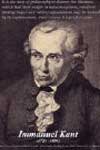 It
is the duty of philosophy to destroy the illusions which had their origin
in misconceptions, whatever darling hopes and valued expectations may be
ruined by its explanations. My chief aim in this work has been completeness;
and I make bold to say, that there is not a single metaphysical problem
that does not find its solution, or at least the key to its solution, here.
Pure reason is a perfect unity.
It
is the duty of philosophy to destroy the illusions which had their origin
in misconceptions, whatever darling hopes and valued expectations may be
ruined by its explanations. My chief aim in this work has been completeness;
and I make bold to say, that there is not a single metaphysical problem
that does not find its solution, or at least the key to its solution, here.
Pure reason is a perfect unity.
(Immanuel Kant, Critique of Pure Reason)
 Philosophy being nothing else but the study of wisdom and truth, it may
with reason be expected, that those who have spent most time and pains in
it should enjoy a greater calm and serenity of mind, a greater clearness
and evidence of knowledge, and be less disturbed with doubt and difficulties
than other men. ... My purpose therefore is, to try if I can discover what
those principles are, which have introduced all that doubtfulness and uncertainty,
those absurdities and contradictions into the several sects of philosophy;
insomuch that the wisest men have thought our ignorance incurable, conceiving
it to arise from the natural dullness and limitation of our faculties. (George
Berkeley, 1710)
Philosophy being nothing else but the study of wisdom and truth, it may
with reason be expected, that those who have spent most time and pains in
it should enjoy a greater calm and serenity of mind, a greater clearness
and evidence of knowledge, and be less disturbed with doubt and difficulties
than other men. ... My purpose therefore is, to try if I can discover what
those principles are, which have introduced all that doubtfulness and uncertainty,
those absurdities and contradictions into the several sects of philosophy;
insomuch that the wisest men have thought our ignorance incurable, conceiving
it to arise from the natural dullness and limitation of our faculties. (George
Berkeley, 1710)
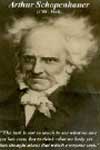 The
task is not so much to see what no one yet has seen, but to think what no
body yet has thought about that which everyone sees. (Arthur Schopenhauer)
The
task is not so much to see what no one yet has seen, but to think what no
body yet has thought about that which everyone sees. (Arthur Schopenhauer)
But life is short, and truth works far and lives long: let us speak the truth. (Arthur Schopenhauer, 1818)
Truth is no harlot who throws her arms round the neck of
him who does not desire her; on the contrary, she is so coy a beauty that
even the man who sacrifices everything to her can still not be certain of
her favours.
(Arthur Schopenhauer)
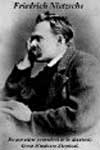 There
is nothing more necessary than truth, and in comparison with it everything
else has only secondary value. This absolute will to truth: what is it?
Is it the will to not allow ourselves to be deceived? Is it the will not
to deceive? One does not want to be deceived, under the supposition that
it is injurious, dangerous, or fatal to be deceived.
There
is nothing more necessary than truth, and in comparison with it everything
else has only secondary value. This absolute will to truth: what is it?
Is it the will to not allow ourselves to be deceived? Is it the will not
to deceive? One does not want to be deceived, under the supposition that
it is injurious, dangerous, or fatal to be deceived.
(Friedrich Nietzsche, 1890)
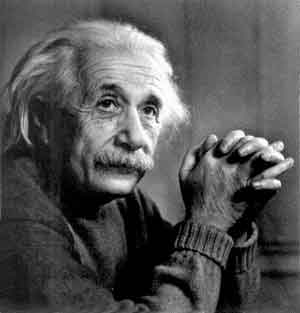 Somebody
who only reads newspapers and at best books of contemporary authors looks
to me like an extremely near-sighted person who scorns eyeglasses. He is
completely dependent on the prejudices and fashions of his times, since
he never gets to see or hear anything else. And what a person thinks on
his own without being stimulated by the thoughts and experiences of other
people is even in the best case rather paltry and monotonous. There are
only a few enlightened people with a lucid mind and style and with good
taste within a century. What has been preserved of their work belongs among
the most precious possessions of mankind. We owe it to a few writers of
antiquity (Plato, Aristotle, etc.) that the people in the Middle Ages could
slowly extricate themselves from the superstitions and ignorance that had
darkened life for more than half a millennium. Nothing is more needed to
overcome the modernist's snobbishness.
Somebody
who only reads newspapers and at best books of contemporary authors looks
to me like an extremely near-sighted person who scorns eyeglasses. He is
completely dependent on the prejudices and fashions of his times, since
he never gets to see or hear anything else. And what a person thinks on
his own without being stimulated by the thoughts and experiences of other
people is even in the best case rather paltry and monotonous. There are
only a few enlightened people with a lucid mind and style and with good
taste within a century. What has been preserved of their work belongs among
the most precious possessions of mankind. We owe it to a few writers of
antiquity (Plato, Aristotle, etc.) that the people in the Middle Ages could
slowly extricate themselves from the superstitions and ignorance that had
darkened life for more than half a millennium. Nothing is more needed to
overcome the modernist's snobbishness.
(Albert Einstein, 1954)
Wisdom of Ancient Indian Philosophy: Buddhism


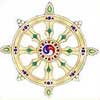 I
greatly enjoy studying the ancient wisdom of Indian Philosophy, in particular
Buddhism,
Kundalini,
Hinduism
and Advaita Vedanta. The knowledge and beauty of the ancient Indians resonates
deeply with me (intuitively and logically). The growing popularity of Buddhism
in western society is very heartening and gives me some hope that our world
still seeks wisdom and truth. 'The Middle Way' and the 'Noble Eightfold
Path' are wonderful guidelines for every person to live by or work towards.
The Wave Structure of Matter is very Buddhist in its foundations (or if
you prefer Buddhism is very scientific), as can be seen in the words of
S. N. Goenka (one of the world's leading Vipassana teachers);
I
greatly enjoy studying the ancient wisdom of Indian Philosophy, in particular
Buddhism,
Kundalini,
Hinduism
and Advaita Vedanta. The knowledge and beauty of the ancient Indians resonates
deeply with me (intuitively and logically). The growing popularity of Buddhism
in western society is very heartening and gives me some hope that our world
still seeks wisdom and truth. 'The Middle Way' and the 'Noble Eightfold
Path' are wonderful guidelines for every person to live by or work towards.
The Wave Structure of Matter is very Buddhist in its foundations (or if
you prefer Buddhism is very scientific), as can be seen in the words of
S. N. Goenka (one of the world's leading Vipassana teachers);
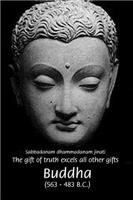 Observing,
observing you will reach the stage when you experience that the entire physical
structure is nothing but subatomic particles: throughout the body, nothing
but kalapas (subatomic particles). And even these tiniest subatomic particles
are not solid. They are mere vibration, just wavelets.
Observing,
observing you will reach the stage when you experience that the entire physical
structure is nothing but subatomic particles: throughout the body, nothing
but kalapas (subatomic particles). And even these tiniest subatomic particles
are not solid. They are mere vibration, just wavelets.
The Buddha's words become clear by experience: Sabbo pajjalito loko, sabbo
loko pakampito. The entire universe is nothing but combustion and vibration.
As you experience it yourself you experience that the entire material world
is nothing but vibration. We have to experience the ocean of infinite waves
surging within, the river of inner sensations flowing within, the eternal
dance of the countless vibrations within every atom of the body. We have
to witness our continuously changing nature. All of this is happening at
an extremely subtle level. These kalapas (subatomic particles) according
to the Buddha, are in a state of perpetual change or flux. They are nothing
but a stream of energies, just like the light of a candle or an electric
bulb. The body (as we call it), is not an entity as it seems to be, but
is a continuum of matter and life-force coexisting.
As you experience the reality of matter to be vibration, you also start
experiencing the reality of the mind: vinnana (consciousness), sanna (perception),
vedana (sensation) and sankhara (reaction).
https://www.buddhanet.net/bvk_study/bvk21d.htm
(Sourced from 'Buddha's path is to experience reality' by S N Goenka OCT
95 Vipassana english news letter, 'Samma Samadhi' April 95 hindi Vipassana
patrika, discourses of Sayagyi U Ba Khin-Sayagyi U Ba Khin Journal-VRI Igatpuri)
 In his book, The Tao of Physics, Fritjof Capra expresses well the eastern
understanding of the universe as a dynamic, interconnected Unity;
In his book, The Tao of Physics, Fritjof Capra expresses well the eastern
understanding of the universe as a dynamic, interconnected Unity;
The most important characteristic of the Eastern world view - one could almost say the essence of it - is the awareness of the unity and mutual interrelation of all things and events, the experience of all phenomena in the world as manifestations of a basic oneness. All things are seen as interdependent and inseparable parts of this cosmic whole; as different manifestations of the same ultimate reality.
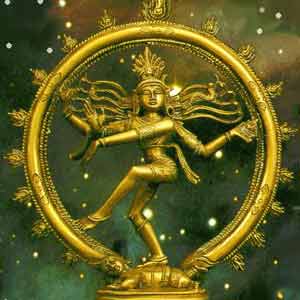 In
Indian philosophy, the main terms used by Hindus and Buddhists have dynamic
connotations. The word Brahman is derived from the Sanskrit root brih –
to grow- and thus suggests a reality which is dynamic and alive. The Upanishads
refer to Brahman as ‘this unformed, immortal, moving’, thus
associating it with motion even though it transcends all forms.’ The
Rig Veda uses another term to express the dynamic character of the universe,
the term Rita. This word comes from the root ri- to move. In its phenomenal
aspect, the cosmic One is thus intrinsically dynamic, and the apprehension
of its dynamic nature is basic to all schools of Eastern mysticism.
In
Indian philosophy, the main terms used by Hindus and Buddhists have dynamic
connotations. The word Brahman is derived from the Sanskrit root brih –
to grow- and thus suggests a reality which is dynamic and alive. The Upanishads
refer to Brahman as ‘this unformed, immortal, moving’, thus
associating it with motion even though it transcends all forms.’ The
Rig Veda uses another term to express the dynamic character of the universe,
the term Rita. This word comes from the root ri- to move. In its phenomenal
aspect, the cosmic One is thus intrinsically dynamic, and the apprehension
of its dynamic nature is basic to all schools of Eastern mysticism.
They all emphasize that the universe has to be grasped dynamically, as it
moves, vibrates and dances.
The Eastern mystics see the universe as an inseparable web, whose interconnections are dynamic and not static. The cosmic web is alive; it moves and grows and changes continually. Modern physics, too, has come to conceive of the universe as such a web of relations and, like Eastern mysticism, has recognised that this web is intrinsically dynamic. The dynamic aspect of matter arises in quantum theory as a consequence of the wave-nature of subatomic particles, and is even more essential in relativity theory, where the unification of space and time implies that the being of matter cannot be separated from its activity. The properties of subatomic particles can therefore only be understood in a dynamic context; in terms of movement, interaction and transformation. (Fritjof Capra, The Tao of Physics, 1975)
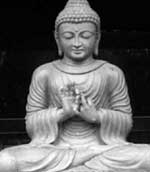 I
share many interests with Fritjof Capra - in particular the excitement of
discovering the connection between modern physics and Eastern mysticism.
It is truly an amazing spooky feeling to understand the basis of ancient
philosophy (all is one, interconnected, dynamic) and see modern physics
(in particular Quantum Theory, Einstein's Relativity and the Wave Structure
of Matter) describing the same dynamic unity of reality / the universe,
though with a different language and scientific foundation.
I
share many interests with Fritjof Capra - in particular the excitement of
discovering the connection between modern physics and Eastern mysticism.
It is truly an amazing spooky feeling to understand the basis of ancient
philosophy (all is one, interconnected, dynamic) and see modern physics
(in particular Quantum Theory, Einstein's Relativity and the Wave Structure
of Matter) describing the same dynamic unity of reality / the universe,
though with a different language and scientific foundation.
In the quote above, Capra explains that matter can not be separated from
activity. Through my reading and study of physics, I am constantly amazed
at how the particle conception of matter has dominated human thought. Once
people get certain ideas in their minds, they become 'habits of thinking'
which are very difficult (if not impossible) to change. This way of looking
at the world has led to the conception of Motion as the motion of Matter
('subatomic particles') rather than the (Wave) Motion of Space (as the Wave
Structure of Matter suggests).
Western Physics (with its particles and forces in 'Space Time' ) has never
correctly understood the Eastern world view. It is also important to understand
that the ancient Indian philosophers did not actually know how the universe
was a dynamic unity, what matter was, how the One Thing / Brahman caused
and connected the many things. Thus Eastern philosophical knowledge is ultimately
founded on mysticism, intuition and insight gained through meditation. Further,
the Eastern philosophers did not believe reality / Brahman could be known
and explained by language.
In the prevailing philosophy of the Orient, the immeasurable (i.e. that which cannot be named, described, or understood through any form of reason) is regarded as the primary reality. (David Bohm, Wholeness and the Implicate Order, 1980)
 The
ancient Indian philosophers thought we could never understand reality /
Brahman because the world we perceived was an illusion (samsara). The problem
is known as the 'One and the Many' and asks how can Brahman (absolute, infinite,
eternal) be related to the many temporal things, i.e. the everyday world
of human experience, the samsara? As Vivekananda says;
The
ancient Indian philosophers thought we could never understand reality /
Brahman because the world we perceived was an illusion (samsara). The problem
is known as the 'One and the Many' and asks how can Brahman (absolute, infinite,
eternal) be related to the many temporal things, i.e. the everyday world
of human experience, the samsara? As Vivekananda says;
If Brahman is all that existed, then there can be no logical concepts, (as logic requires two things), nor indeed any understanding of how this One thing could cause the Many changing things which we experience in the world. (Vivekananda)
Philosophy and physics are both deeply affected by the postmodern notion of 'no absolute truth', that we cannot know reality. My problem with this attitude is the presumption that because we have never worked out reality, we never will (and that the nature of reality itself is 'unknowable'). It is important to have a skeptical mind. However when presented with knowledge, your mind is skeptically open (not closed) to its simplicity and truth. As David Hume and Michel de Montaigne express;
I cannot find, I cannot imagine any such reasoning. But I keep my mind still open to instruction, if any one will vouchsafe to bestow it upon me. (David Hume, 1737)
Teach him a certain refinement in sorting out and selecting his arguments, with an affection for relevance and so for brevity. Above all let him be taught to throw down his arms and surrender to truth as soon as he perceives it, whether the truth is born at his rival’s doing or within himself from some change in his ideas. (Michel de Montaigne, 1592)
Based upon my studies of ancient philosophy and modern physics, I recognise the Metaphysics of Space and Motion and the Wave Structure of Matter as an elegant conception of the universe, far superior in its simplicity to the current paradigm of particles and fields in space-time (and all the resultant paradoxes of particle wave duality, non locality, indeterminism, role of observer to collapse wave functions, etc.). The Wave Structure of Matter, by being the most simple language for describing reality, and by explaining and solving many of these existing problems, should be considered by mainstream science and society.
 Some of my Favourite Philosophy Quotes
Some of my Favourite Philosophy Quotes
All things are woven together and the common bond is sacred,
and scarcely one thing is foreign to another, for they have been arranged
together in their places and together make the same ordered Universe.
For there is one Universe out of all, one God through all, one substance
and one law, one common Reason of all intelligent creatures and one Truth.
Frequently consider the connection of all things in the universe.
We should not say ‘I am an Athenian’ or ‘I am a Roman’
but ‘I am a citizen of the Universe. (Marcus Aurelius,
Meditations)
All things are parts of one single system, which is called Nature; the
individual life is good when it is in harmony with Nature.
(Zeno, 300 - 260 B.C.)
Sabbadanam dhammadanam jinati - The gift of truth excels all other gifts. (Buddha)
One is one’s own refuge, who else could be the refuge? The wise make an island of themself that no flood can overwhelm. (Buddha)
The fundamental element of the cosmos is Space. Space is
the all-embracing principle of higher unity. Nothing can exist without
Space. .. According to ancient Indian tradition the Universe reveals itself
in two fundamental properties: as Motion and as that in which motion takes
place, namely Space. This Space is called Akasa .. derived from the root
kas, 'to radiate, to shine', and has therefore the meaning of ether which
is conceived as the medium of movement. The principle of movement, however,
is Prana, the breath of life, the all-powerful, all-pervading rhythm of
the universe. (Lama Anagarika Govinda, 1969)
We are enabled to apprehend at all what is sublime and noble only by the
perpetual instilling and drenching of the reality that surrounds us. We
can never have enough of nature. (Henry David Thoreau)
A human being is part of the whole called by us universe ... We experience
ourselves, our thoughts and feelings as something separate from the rest.
A kind of optical delusion of consciousness. This delusion is a kind of
prison for us, restricting us to our personal desires and to affection
for a few persons nearest to us. Our task must be to free ourselves from
the prison by widening our circle of compassion to embrace all living
creatures and the whole of nature in its beauty. The true value of a human
being is determined by the measure and the sense in which they have obtained
liberation from the self. We shall require a substantially new manner
of thinking if humanity is to survive. (Albert Einstein)
Communities tend to be guided less than individuals by
conscience and a sense of responsibility. How much misery does this fact
cause mankind! It is the source of wars and every kind of oppression,
which fill the earth with pain, sighs and bitterness. (Albert
Einstein)
Reality cannot be found except in One single source, because of the interconnection
of all things with one another. (Leibniz, 1670)
.. man's general way of thinking of the totality, i.e. his general world
view, is crucial for overall order of the human mind itself. If he thinks
of the totality as constituted as independent fragments, then that is
how his mind will tend to operate, but if he can include everything coherently
and harmoniously in an overall whole that is undivided, unbroken and without
border (for every border is a division or break) then his mind will tend
to move in a similar way, and from this will flow an orderly action within
the whole. (David Bohm, Wholeness and the Implicate Order,
1980)
Indeed, man has always been seeking wholeness - mental, physical, social
and individual. (David Bohm, 1980)
How delicate her feet who shuns the ground, Stepping a-tiptoe on the heads of men. (Homer)
Today [the voice of women] is being heard loud and clear. But I do not read the welcome triumph of feminism, social, economic, and creative, as a brief for postmodernism. The advance, while opening new avenues of expression and liberating deep pools of talent, has not exploded human nature into little pieces. Instead, it has set the stage for a fuller exploration of the universal traits that unite humanity. (Edward O. Wilson, Consilience)
The world is given to me only once, not one existing and
one perceived. Subject and object are only one. The barrier between them
cannot be said to have broken down as a result of recent experience in
the physical sciences, for this barrier does not exist.
(Erwin Schrodinger)
Choose only one master, Nature. (Rembrandt)
Fantasy, abandoned by reason, produces impossible monsters; united with it, she is the mother of the arts and the origin of marvels. (Francisco de Goya)
.. as a philosopher, I have a right to ask for a rational explanation of religious faith. ... it is improbable that the material substance which is the origin of all things was created by divine Providence. It has and has always had a force and nature of its own. (Cicero)
The Slow Arrow of Beauty. The noblest kind of beauty is that which does not transport us suddenly, which does not make stormy and intoxicating impressions (such a kind easily arouses disgust) but that which slowly filters into our minds. (Friedrich Nietzsche)
It is a ticklish question, the steering of the public, good and docile as it is on the whole. Although as a rule the absurd culminates, and it seems impossible for the voice of the individual ever to penetrate through the chorus of foolers and fooled, still there is left to the genuine works of all times a quite peculiar, silent, slow, and powerful influence; and as if by a miracle, we see them rise at last out of the turmoil like a balloon that floats up out of the thick atmosphere of this globe into purer regions. Having once arrived there, it remains at rest, and no one can any longer draw it down again. (Arthur Schopenhauer)
Feminism
Women Sexuality Nature Cosmos
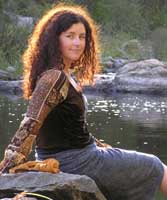 Through
my studies and living in nature I have cultivated my own understanding of
Feminism
based on evolution, philosophy and metaphysics. So now, as a woman, I am
exploring what it really means to be 'a woman'. It is a complex, inherently
personal and thought provoking subject for me. Ultimately I am considering
how woman is necessarily connected to man, child, nature, society and cosmos
by understanding how matter exists in Space and is interconnected to all
other matter. Female sexuality is considered (and celebrated!) from evolutionary
foundations and through the personal cultivation of mind, body and our relationship
(both reason and senses) with Nature and the Cosmos.
Through
my studies and living in nature I have cultivated my own understanding of
Feminism
based on evolution, philosophy and metaphysics. So now, as a woman, I am
exploring what it really means to be 'a woman'. It is a complex, inherently
personal and thought provoking subject for me. Ultimately I am considering
how woman is necessarily connected to man, child, nature, society and cosmos
by understanding how matter exists in Space and is interconnected to all
other matter. Female sexuality is considered (and celebrated!) from evolutionary
foundations and through the personal cultivation of mind, body and our relationship
(both reason and senses) with Nature and the Cosmos.
From reading contemporary feminist philosophy I realise this is a very alternative
view (as I see things, postmodern feminist philosophy is abstract, very
difficult to understand, and thus neither relates nor has any great affect
on the everyday lives of women - which should be its central and most important
function). Postmodernism, relativism, existentialism and structuralism have
heavily influenced modern feminism as the following quote explains;
Postmodern approaches to gender, sex, and sexuality to varying degrees adopt a radical scepticism with regard to the natural and the real, and promote a programme of 'denaturalising' in which the idea of biological essence is dissolved and replaced with social constructionism. (Edmund Standing, Postmodern Approaches to Gender, Sex, and Sexuality - A Critique)
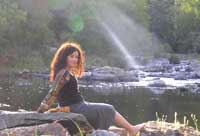 As
a feminist, I encourage the cultivation of women's minds to enrich themselves,
their relationships and life. However such cultivation is not solely up
to the individual and requires the gentle guidance of philosophy to recognise
the truth and 'good' in life. Women (and men!) are wonderful biological
beasts with an amazing ability to consciously think, choose and make decisions
(create thyself that is worth knowing!). My approach is of the middle way
between the nature and nurture divide. Both the biological and social exist,
evolve, limit and inform one another. To me, feminism is a celebration of
this complex interconnection and the joyful wisdom it provides!
As
a feminist, I encourage the cultivation of women's minds to enrich themselves,
their relationships and life. However such cultivation is not solely up
to the individual and requires the gentle guidance of philosophy to recognise
the truth and 'good' in life. Women (and men!) are wonderful biological
beasts with an amazing ability to consciously think, choose and make decisions
(create thyself that is worth knowing!). My approach is of the middle way
between the nature and nurture divide. Both the biological and social exist,
evolve, limit and inform one another. To me, feminism is a celebration of
this complex interconnection and the joyful wisdom it provides!
My work and ideas are deeply influenced by the beauty and sensuality of
women in harmony with Nature (how we live and cultivate ourselves within
our environment). This cultivation is of the body, mind and environment
(which cannot be separated).
One aspect of my feminine cultivation is an aesthetic appreciation of the beauty
of the female body. Over the past year I have collected a beautiful range
of 'Women, Eroticism and Nature' pictures and developed a close affinity
with Vintage Erotica (which portray 'real' sensual women with curves, not
the air-brushed rake thin models of today).
I realise though, that some feminists may consider the use of these images
disturbing and rebel against the idea that a women is (partly at least)
defined by how they look. I am more inclined to believe that both the body
and the mind are beautiful (and closely interconnected) and try to cultivate
both to increase the pleasure and joy of life (for myself and others).
My understanding is that erotic sensual art that depicts the beauty of sexuality is not necessarily demeaning to women (and can actually be empowering). Good erotic art portrays good healthy sex; which is joyful, exciting, intimate, consenting, safe, respectful, and pleasurable. Violence, degradation, the treatment of people as objects and the obvious faking of sexual pleasure (e.g. pornography) has no place in my understanding of quality erotic art.
Internet Research Study on the Biological and Cultural Evolution of Human Sexual Behaviour
All human beings are sexual creatures and
there are few, if any, for whom the whole area of sexuality and relationships
is not of interest and concern. (Peter Vardy)
Analyse any human emotion, no matter how far it may be removed from the
sphere of sex, and you are sure to discover somewhere the primal impulse,
to which life owes its perpetuation. The primitive stages can always be
re-established; the primitive mind is, in the fullest meaning of the word,
imperishable.
(Sigmund Freud, 1915)
If insemination were the sole biological function of sex, it could be achieved
far more economically in a few seconds of mounting and insertion. Indeed,
the least social of mammals mate with scarcely more ceremony. The species
that have evolved long-term bonds are also, by and large, the ones that
rely on elaborate courtship rituals. . . . Love and sex do indeed go together.
(Edward O. Wilson, Cambridge, MA: Harvard University Press
(1978). On Human Nature)
Evolutionary philosophy clearly appreciates the central significance of sex and reproduction for our survival. This explains why sex and sensuality trigger such strong emotional responses in people, and why they are an important (and beautiful) part of life that is enjoyed by both men and women. However, many feminists (and many people) do not appreciate evolution and its necessary limitations on how we are to live. As Simone de Beauvoir famously proclaimed;
One is not born, but rather becomes a woman. (Simone de Beauvoir, The Second Sex, 1949)
Postmodern approaches to gender, sex, and sexuality to varying degrees adopt a radical scepticism with regard to the natural and the real, and promote a programme of 'denaturalising' in which the idea of biological essence is dissolved and replaced with social constructionism. (Edmund Standing, Postmodern Approaches to Gender, Sex, and Sexuality - A Critique)
The notion of what is means to be 'a woman' in modern feminist thought falls into the vast abyss of imagination, interpretation and definition by individuals (of no absolute truth). While this may liberate women, it unfortunately offers little guidance and does not abide by the fact that women are constructed of matter, interact with all other matter in the universe, and have evolved certain genetic traits as part of their evolutionary ancestry. Thus humans do exercise freedom and choice, but this is limited by evolution and the laws of Nature. As writes Edward O. Wilson;
'.. culture has risen from the genes and forever bears their stamp. With the invention of metaphor and new meaning, it has at the same time acquired a life of its own. In order to grasp the human condition, both genes and culture must be understood, not separately in the traditional manner of science and the humanities, but together, in recognition of the realities of human evolution.' (E. O. Wilson, Consilience, 1998)
Help Humanity
"You must be the change you wish to see in the world."
(Mohandas Gandhi)
 "When forced to summarize the general theory of relativity in one sentence:
Time and space and gravitation have no separate existence from matter. ... Physical objects are not in space, but these objects are spatially extended. In this way the concept 'empty space' loses its meaning. ... The particle can only appear as a limited region in space in which
the field strength or the energy density are particularly high. ...
"When forced to summarize the general theory of relativity in one sentence:
Time and space and gravitation have no separate existence from matter. ... Physical objects are not in space, but these objects are spatially extended. In this way the concept 'empty space' loses its meaning. ... The particle can only appear as a limited region in space in which
the field strength or the energy density are particularly high. ...
The free, unhampered exchange of ideas and scientific conclusions is necessary for the sound development of science, as it is in all spheres
of cultural life. ... We must not conceal from ourselves that no improvement in the present depressing situation is possible without
a severe struggle; for the handful of those who are really determined to do something is minute in comparison with the mass of the lukewarm
and the misguided. ...
Humanity is going to need a substantially new way of thinking if it is to survive!" (Albert Einstein)
 We can now deduce the most simple science theory of reality - the wave structure of matter in space. By understanding how we and everything around us are interconnected
in Space we can then deduce solutions to the fundamental problems of human knowledge in physics, philosophy, metaphysics, theology, education, health, evolution and ecology, politics and society.
We can now deduce the most simple science theory of reality - the wave structure of matter in space. By understanding how we and everything around us are interconnected
in Space we can then deduce solutions to the fundamental problems of human knowledge in physics, philosophy, metaphysics, theology, education, health, evolution and ecology, politics and society.
This is the profound new way of thinking that Einstein
realised, that we exist as spatially extended structures of the universe - the discrete and separate body an illusion. This simply confirms the
intuitions of the ancient philosophers and mystics.
Given the current censorship in physics / philosophy of science journals (based on the standard model of particle physics / big bang cosmology) the internet is the best hope for getting new knowledge
known to the world. But that depends on you, the people who care about science and society, realise the importance of truth and reality.
It is Easy to Help!
Just click on the Social Network links at top of page, or copy a nice image or quote you like and share it. We have a wonderful collection of knowledge from the greatest minds in human history, so people will appreciate your contributions. In doing this you will help a new generation of scientists see that there is a simple sensible explanation of physical reality (One Substance, One Law) - the source of truth and wisdom, the only cure for the madness of man! Thanks! Geoff Haselhurst (Updated May, 2025)
A new scientific truth does not triumph by convincing its opponents and making them see the light, but rather because its opponents eventually die, and a new generation grows up that is familiar with it. (Max Planck, 1920)
"All that is necessary for evil to succeed is for good people to do nothing."
(Edmund Burke)
"In a time of universal deceit - telling the truth is a revolutionary act."
(George Orwell)
"Hell is Truth Seen Too Late."
(Thomas Hobbes)
Legal Disclaimer and Privacy Policy












